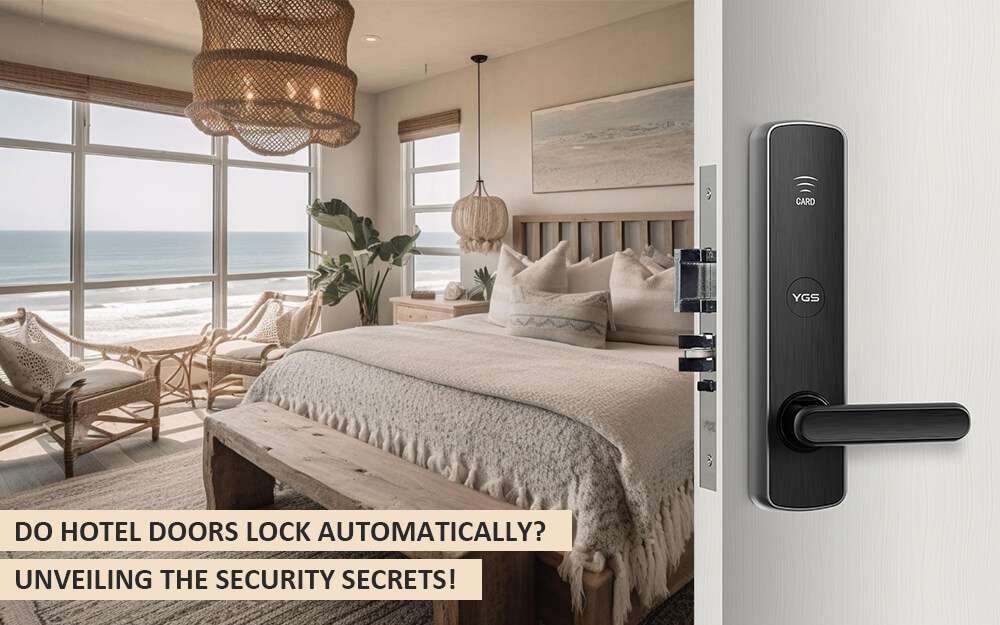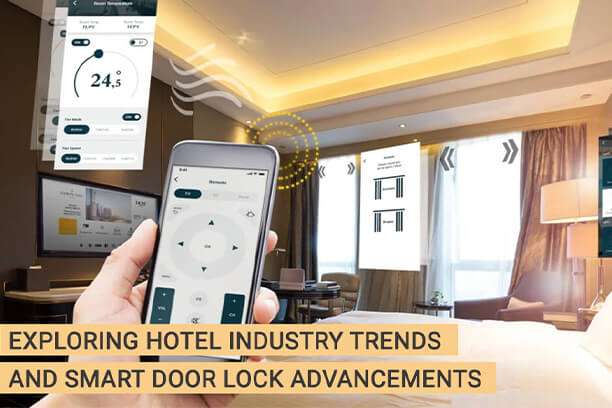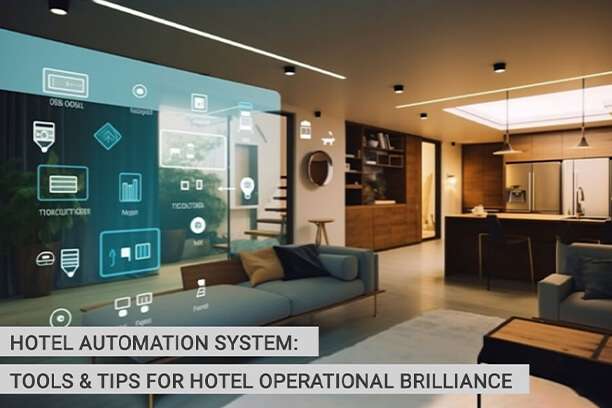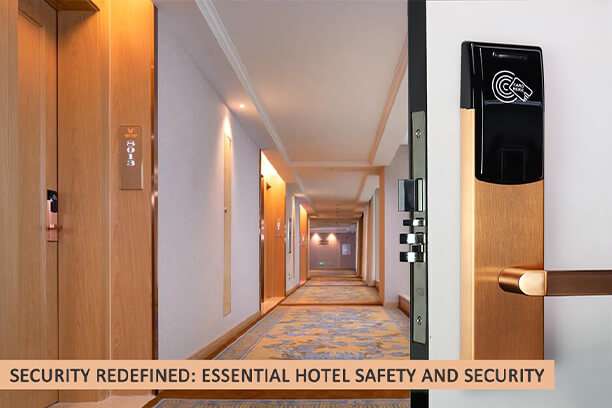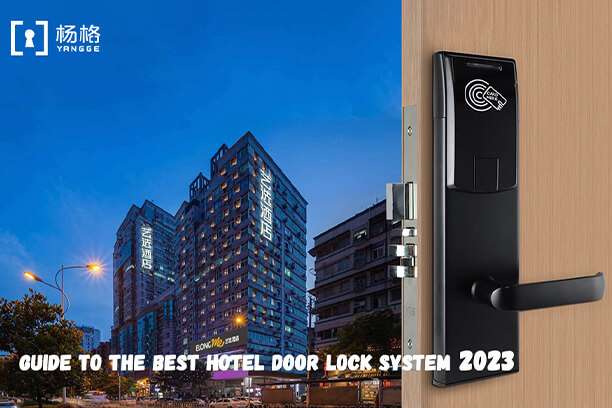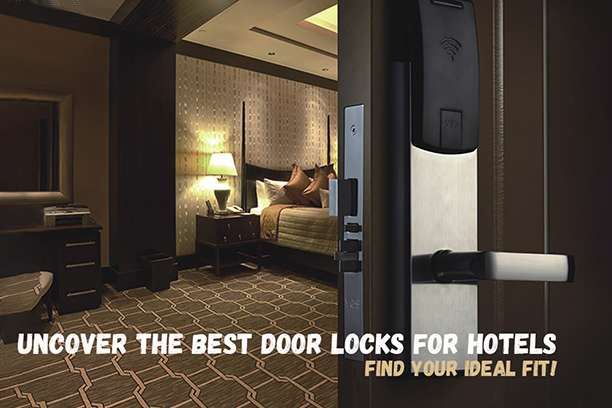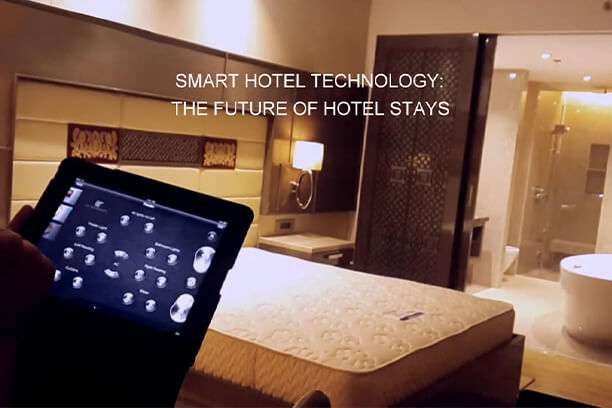Do hotel doors lock automatically? Everyone who works in the hotel industry, including hotel owners, staff, and guests, has asked this question. Here, we will provide a detailed answer to this question and reveal how modern technology makes hotel doors lock automatically possible.
As technology advances, hotel door lock systems have evolved from manual locking to smart automatic locking. This intelligent feature significantly enhances the overall hotel security and provides customers with a more convenient and enjoyable stay. Let’s delve into the complexity of hotel door lock security, uncovering the technological mysteries behind automatic locking systems.
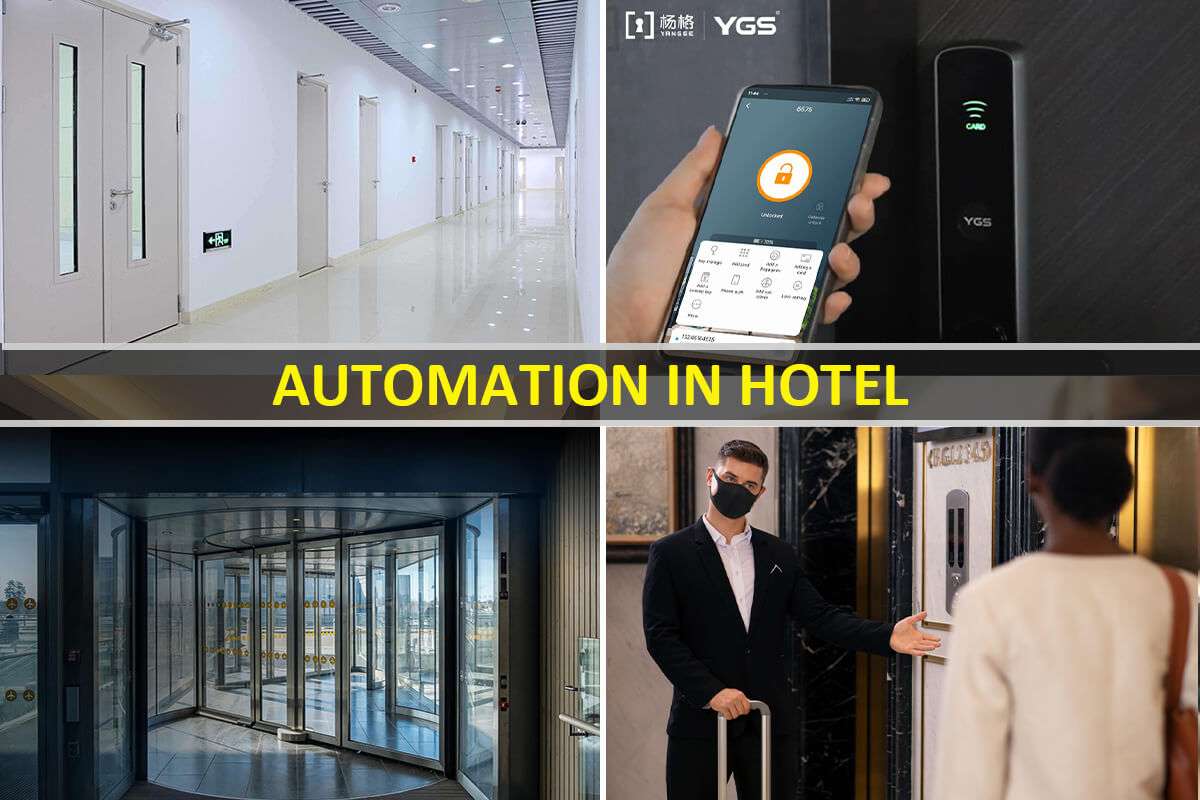
In this era of smart technology, automation has been widely applied across various industries, fundamentally changing people’s lifestyles. The hotel industry is no exception, adopting automation features to enhance guest experiences.
Common automated hotel processes include automatic locking, hotel management automation, smart room automation, voice assistants, and robot service automation, among others. These advanced smart technologies simplify hotel operations to the maximum extent, and guests receive highly convenient, efficient, and personalized services.
Especially in the field of hotel door safety, automated systems have had a profound impact. Hotel doors lock automatically primarily relies on electronic hotel door lock devices, key card access functionality, automatic electronic locking systems, automatic alarm functions, and more.
When the door is closed, automatic locking typically initiates automatically, ensuring that the door is locked securely without any additional action required. This helps prevent guests from forgetting to lock the door, thereby enhancing security.
In conclusion, advanced hotel door automatic locking technology facilitates both easier and faster access for guests as well as more secure and reliable access control for hotels. Following, we’ll explore more about these advanced technologies and reveal their unique contribution to enhancing hotel security levels.
Understanding Automatic Locking Mechanism
The automatic locking mechanism is a design that automatically engages the locking operation under specific conditions. The door lock system can lock automatically without user intervention. With this mechanism, hotel doors can realize locking automatically, providing additional security and convenience for hotels. Here is a series of common automatic locking conditions:
Time Trigger
Electronic hotel lock systems allow admins to set specific locking times according to management needs. For example, the hotel management department can set automatic locking at midnight. This ensures that even if hotel staff forget to lock the doors, the door lock will automatically perform this operation, ensuring an additional layer of security during the nighttime.
No Activity Trigger
The door lock system automatically triggers the locking operation when no activity (such as door opening or card swiping) is detected for a certain period. This helps prevent unauthorized individuals from entering after guests have left.
Leave Trigger
Some door lock systems can achieve automatic locking by detecting whether guests have left the door’s vicinity. Sensors or other technologies can accomplish this, preventing guests from failing to lock the room when they leave.
Error Operation Trigger
Incorrect operations can also trigger the automatic locking of the door. When a user swipes the card incorrectly or enters the wrong password repeatedly, the door lock automatically locks. Access is restricted until the lock is released, making access to the hotel more difficult and enhancing safety.
Overall, the automatic locking mechanism contributes to increased security, reducing the risk of guests manually locking the doors. It is worth noting that different hotels and door lock systems may adopt different automatic locking strategies, and the specific implementation may vary.
Manual vs. Automatic Locking Systems
Manual locking systems and automatic electronic locking systems differ primarily in terms of their locking methods and triggering conditions. Here is a detailed comparison between them:
| Feature | Manual Locking System | Automatic Locking System |
|---|---|---|
| Operation | Users need to use a mechanical key to lock the door again after closing it to ensure security. | As long as the user closes the door correctly, auto-locking will occur automatically. |
| Security | Involves human factors, users may forget to lock the door, increasing security risks. | With smart features, such as detecting unclosed doors, and ensuring automatic locking within a certain timeframe. |
| Power Requirement | No continuous power supply needed, as locking is manually done by users. | Requires power since it monitors the door’s status continuously and executes locking operations when necessary. |
| User Experience | Requires manual operation, which may be cumbersome. Forgetting to lock the door could pose a threat to the hotel. | More convenient. Users only need to ensure the door is closed correctly, without worrying about forgetting to lock it. |
| Cost | Relatively simple, with lower installation and maintenance costs. | Initial costs may be high, and ongoing maintenance may require more frequent software and hardware updates. |
| Usability | Simple operation, no need for user training. | Users may need to adapt to the system’s automated operations, requiring management training for the entire system. |
| Convenience | Requires physical key operation, which may be less convenient and has the risk of being lost. | Provides greater convenience, as users don’t have to consciously lock the door – the security system automatically performs this task. |
Common Types of Automatic Locks in Hotels
Door Closer
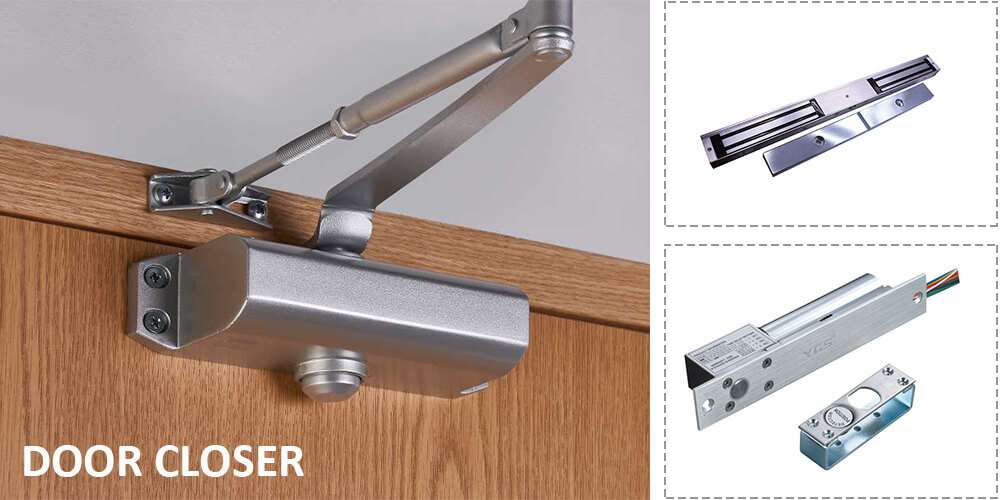
Door closer – a mechanical device installed on a door, with the primary purpose of ensuring that the door automatically closes after being opened. Utilizing mechanical devices such as springs or cylinders, force is applied to smoothly return the door to its closed position.
Within the classification of door closers, there are various types based on the form of installation, including:
- Surface-Mounted Door Control Device:
Surface-mounted door control devices are equipped with a hydraulic cushion oil pump device, allowing the door to close automatically after opening. Typically installed on the surface of the door, visible on the exterior side.
| Pros | Cons |
| Easy to install without modifying the door structure. | Relatively prominent appearance, may affect the overall aesthetics of the door. |
| Adjustable, and suitable for different types and weights of doors. | Some designs may cause vibration or noise. |
| Relatively cost-effective. |
- Concealed Door Control Device:
Concealed door control devices consist of hydraulic cushion springs, tracks, sliders, and linkages. It achieves automatic closure by providing a restoring torque to the linkage, driving the slider to move within the track. Generally installed inside the door frame or door leaf, not visible externally.
| Pros | Cons |
| Aesthetic appearance without disrupting the overall door design. | Relatively complex installation, requiring embedding into the door or door frame. |
| Suitable for upscale residences and commercial spaces, enhancing spatial aesthetics. | Typically more expensive. |
- Door Bottom Spring:
Door bottom springs come in horizontal and vertical types, consisting of upper and lower parts. Its function is equivalent to a double spring hinge, automatically closing the door leaf after opening. Usually installed at the bottom of the door, along the bottom edge of the door leaf.
| Pros | Cons |
| Increases door sealing, helping to block wind, dust, and noise. | Some designs may be affected by uneven ground, requiring regular adjustments. |
| Easy installation without affecting the door’s appearance. | Some door bottom springs may generate noise. |
- Floor Spring Door Control Device:
Floor spring door control devices consist of upper and lower parts, including top pivots, top pivot base plates, pivot rods, and bases. When the door leaf opening angle is less than 90 degrees, it can achieve bidirectional automatic closure. Generally installed underground, often used with large and heavy door leaves.
| Pros | Cons |
| Suitable for large doors, providing reliable closing force. | Complex installation, usually requiring professional installation. |
| Sleek appearance without affecting the door’s appearance. | Relatively expensive, suitable for specific door types and locations. |
Electronic Hotel Lock
An electronic hotel lock is a smart door lock system designed to achieve automated management of hotel room doors. This electronic door lock utilizes advanced technology to provide a more convenient and secure user access solution. Here are different types of electronic locks and their characteristics:
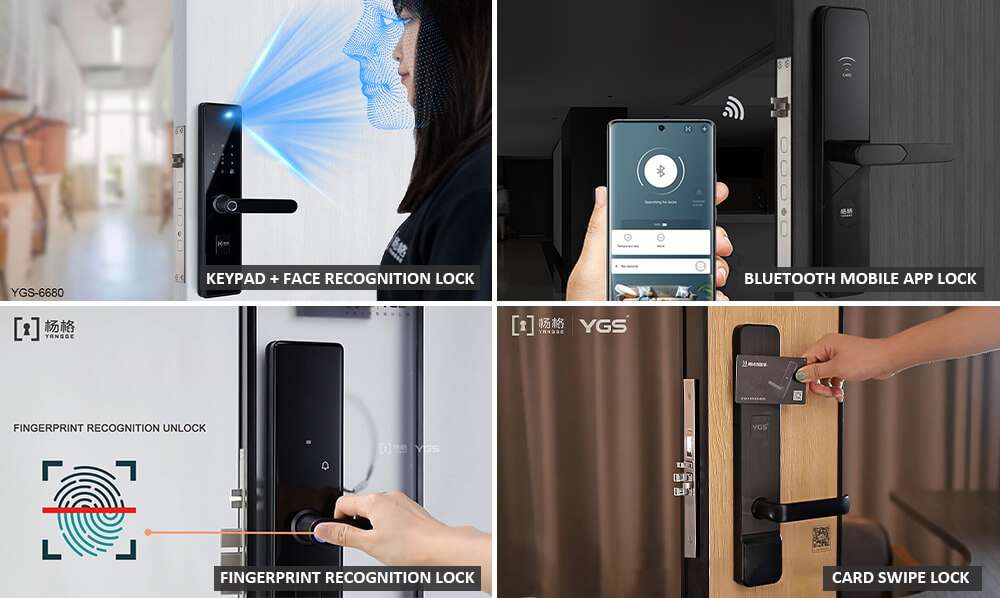
- Card Swipe Lock:
Card swipe locks include magnetic card locks and RFID card door locks. Most hotels use RFID key card systems for guest room door locks. When guests swipe the card key, the lock’s sensor reads the encoded information on the card. If the information matches, it automatically triggers the lock to unlock; otherwise, it remains locked.
| Pros | Cons |
| Easily access by swipe card. | Risk of loss: Lost cards may pose a security risk unless promptly deactivated. |
| Easy to manage: Cards can be canceled or replaced, improving management efficiency. | Maintenance cost: Magnetic cards need regular replacement, increasing maintenance costs. |
- Keypad Lock:
This type of lock is equipped with a keypad, which can be an electronic keypad or a mechanical keypad. When guests enter a preset password on the keypad, the door lock automatically recognizes the password’s validity, allowing access if valid.
| Pros | Cons |
| No physical cards needed: Guests only need to remember the password. | Risk of password leakage: Passwords may be leaked or guessed, affecting security. |
| Easier to change: Passwords can be changed as needed. | Memory burden: Guests need to remember the password, which may be burdensome. |
- Biometric Recognition Lock:
In recent years, biotech has been widely used in hotels, providing a higher level of security and convenience for authentication. Biometric recognition locks mainly include facial recognition locks, fingerprint recognition locks, palmprint recognition locks, etc. They unlock by scanning the biometric features of the authorized person.
| Pros | Cons |
| High security: Difficult to forge or impersonate biometric features. | Higher equipment cost: Biometric recognition technology may increase system deployment costs. |
| No cards or passwords needed: No need to carry cards or remember passwords. | Sensitivity issues: Some systems may be affected by factors such as dry or dirty fingerprints. |
- Bluetooth Mobile App Lock:
Modern hotels may adopt Bluetooth technology, allowing guests to use their mobile devices to unlock. When a smartphone is granted access permission by the system, it can transmit unlock commands to a door lock via Bluetooth. This technology enables remote unlocking and keyless entry, providing greater flexibility.
| Pros | Cons |
| High security: Difficult to forge or impersonate biometric features. | Higher equipment cost: Biometric recognition technology may increase system deployment costs. |
| No cards or passwords needed: No need to carry cards or remember passwords. | Sensitivity issues: Some systems may be affected by factors such as dry or dirty fingerprints. |
Hotel Door Lock System Development & Automation
The rapid advancement of intelligent technology has driven continuous progress in the hotel door lock industry, especially in hotel door lock systems. Traditional keys and lock systems are gradually being replaced by modern smart card door lock technology. And this trend is becoming increasingly evident in the modern hotel market.
Let’s delve into the world of hotel door lock systems, exploring different types of hotel room locks and their impact on hotel security and customer experience.
Traditional Keys and Lock Systems
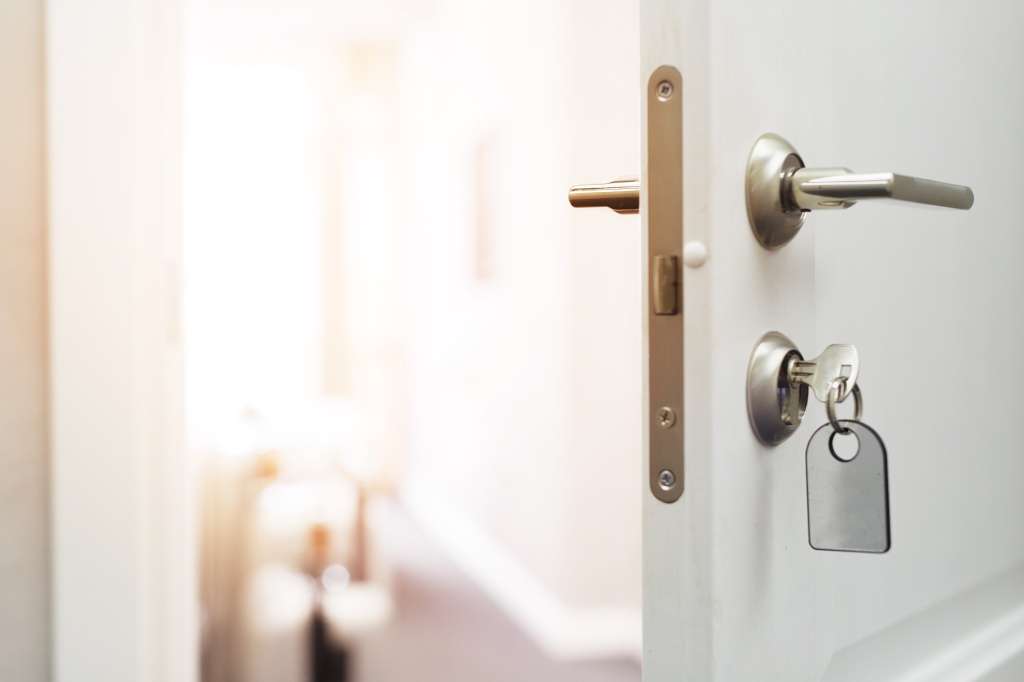
The origins of hotel door locks lie in traditional keys and lock systems, typically comprising metal locks and corresponding physical keys. Door locks of this type are characterized by their simplicity and stability, requiring no power to operate and only requiring a hotel key to unlock. However, this system poses some challenges that demand careful management to ensure the security of hotel rooms.
To guarantee hotel security, not only must guests safeguard their hotel keys, but hotel managers also need to allocate and manage keys sensibly. This necessitates significant human and material resources for management, resulting in relatively high maintenance costs. It is necessary to replace the entire set of locks in a room if a physical key is lost, otherwise the entire room may be compromised.
Moreover, this traditional system does not support the hotel room doors lock automatically. As a result, the entire door lock system lacks modern automated features (like automatic door locking feature), hindering the potential for the hotel to enhance customer experience and security.
Electronic Key Card Systems
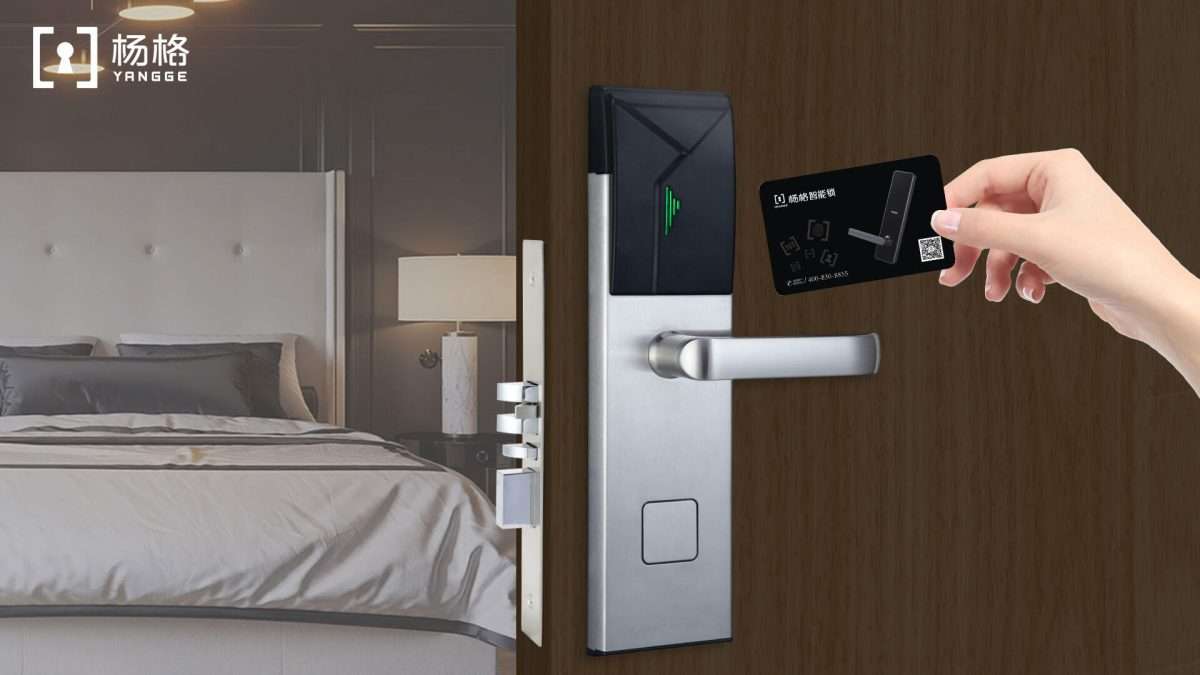
In recent years, electronic key card systems have steadily replaced traditional physical keys as an alternative to hotel access control management. In the market, there are two popular types of electronic key card systems: RFID key card systems and magnetic card systems. These systems rely on electrical power, allowing users to unlock access by inserting or swiping a pre-programmed hotel key card.
These electronic key card systems not only provide high security but also come with various automated features. For instance, the system can automatically control access based on periods, manage different user permissions, and monitor access events in real time.
These automation features contribute to enhancing hotel security, preventing unauthorized access, and simplifying access control management. Admins can configure these automation features based on specific needs and security policies to ensure automatic locking operations in specific scenarios.
Smart Lock Technology
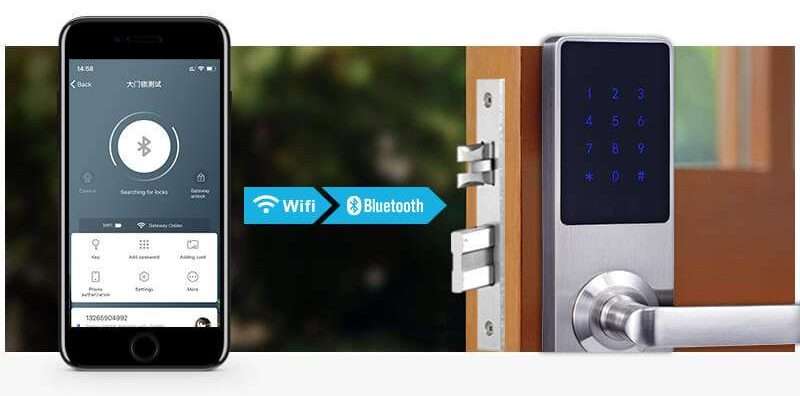
Smart lock technology stands out as the top choice for modern hotel door lock systems. This key technology not only offers advanced security but also incorporates various features such as biometrics, passwords, and mobile applications, making access to hotel rooms more intelligent and secure.
These systems build upon electronic hotel card lock systems by adding more advanced and challenging authentication methods, increasing both security and convenience. They also have automatic locking features. Once a user successfully enters a room, the system can automatically lock the door based on preset conditions, eliminating the need for manual operation.
Additionally, smart lock technology supports remote management, allowing hotel administrators to monitor and manage each lock remotely via the network. This feature holds significant importance for overall hotel operations and security management.
Benefits of Hotel Doors Lock Automatically
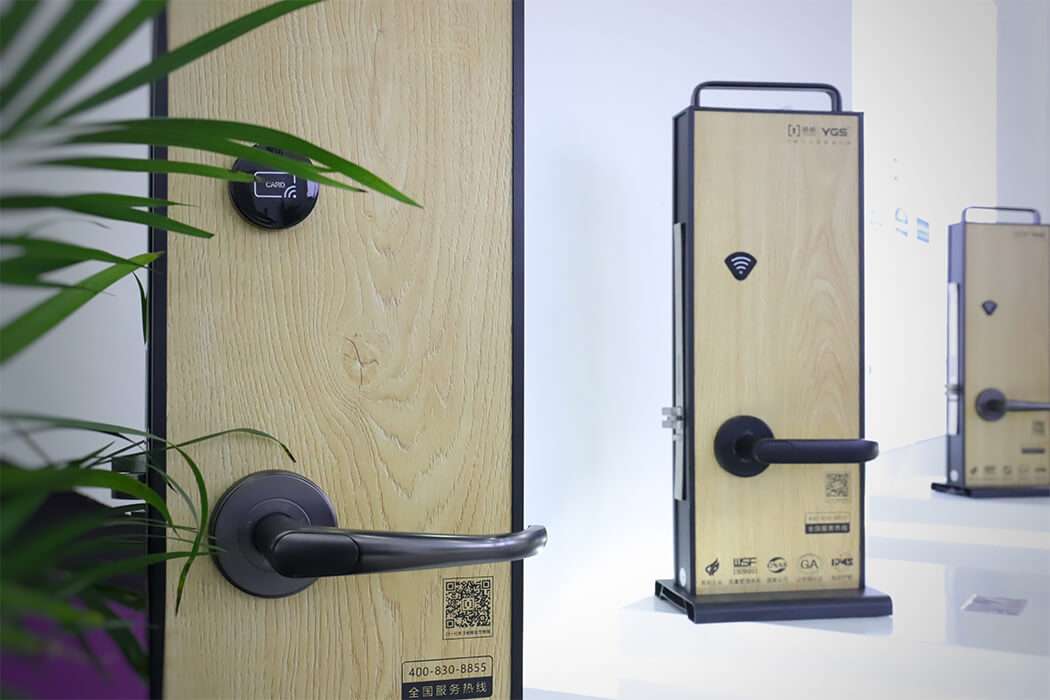
The automatic locking of hotel electronic door locks serves several purposes, primarily centered around safety and convenience.
- Guest Safety: Automatic locking ensures the safety of hotel guests during their stay. When a guest enters the room and closes the door, the system automatically locks, ensuring that only authorized personnel can open the door, thus protecting the safety of guests and their belongings.
- Convenience: The automatic locking system provides additional convenience for guests, eliminating the need for them to manually lock the door when leaving the room. This enhances the overall staying experience and reduces inconveniences caused by forgetting to lock the door.
- Energy Savings: Some automatic lock systems integrate with energy management systems, automatically shutting down power devices such as lights and air conditioning when guests leave the room, effectively saving energy costs.
- Emergency Situations: In emergencies, automatic lock systems can provide a quick and effective response, including automatic unlocking and central control, ensuring the safety of guests and staff.
- Monitoring and Recording: Automatic lock systems often keep records of each unlocking and locking event. This helps hotel management track room usage and provides relevant information when needed.
In summary, automatic locking of hotel room doors is essential, playing an irreplaceable role in improving overall hotel operational efficiency, customer satisfaction, and safety.
Conclusion
It can be seen that automatic locking of hotel doors is entirely achievable and can bring numerous benefits to the hotel. The smart hotel door lock system, through its automatic locking mechanism, facilitates the automation of hotel doors. This innovative technology not only enhances the overall hotel security but also improves the convenience for customers, thereby increasing customer satisfaction with the hotel.
Online Enquiry Form
Related Blog
With more than 20 years of smart lock experience, YGS could provide a set of hotel door lock management solutions for your hotel business.
Exploring Hotel Industry Trends and Smart Door Lock Advancements
Against the backdrop of the thriving hotel industry, closely aligning with hotel industry trends is crucial for both hotel operators and customers. The successful integration of cutting-edge technology with traditional hotel services has given rise to numerous transformations. This article explores the evolving landscape of the hotel…
Hotel Automation System: Tools & Tips for Hotel Operational Brilliance
In the dynamic tapestry of today’s technological advancements, automation stands as a pivotal innovation weaving through diverse industries. Within the realm of service sectors, the hotel industry is known for its commitment to streamlined operations and heightened guest satisfaction. So they placed…
Security Redefined: Essential Hotel Safety and Security
In modern society, hotels have become an essential part of people’s lives, often considered as a second home. Besides providing comfortable accommodations and high-quality services, one of the primary responsibilities of hotels is to ensure hotel guest safety. After all, hotels without effective security measures cause irreparable losses to guests…
Guide to the Best Hotel Door Lock System 2023
In today’s highly security-conscious society, hotel door lock systems have become an essential part of hotel security management. These systems provide guests with a high level of security and offer effective check-in management and security control tools for hotel management. The following content will explore the best…
Uncover the Best Door Locks for Hotels -Find Your Ideal Fit!
Currently, the hospitality industry is experiencing an unprecedented boom in the era of fully opened travel. As hotels face intense competition, it has become crucial to elevate guest experiences and prioritize safety measures, particularly when it comes to door locks for hotels. This article aims to provide you…
Smart Hotel Technology: The Future of Hotel Stays
Today, with the constant development of modern technology, the smart internet era has penetrated all aspects of various industries. Especially in the hotel industry, traditional hotel management model is no longer suitable for modern hotel management needs. The emergence of smart hotel technology follows the trend…

